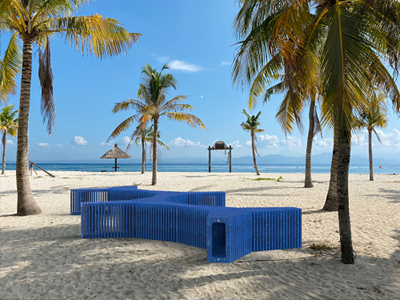TRICORAL: Repurposing Oceanic Plastic Waste
It is estimated that approximately 8 million tonnes of plastics leak into the ocean each year, with 80% of ocean plastic originating from land. Ocean plastics have severe economic and ecological impact, including increasing cost of waste management, reduction in tourism income, accidental entanglement and entrapment of marine animals, as well as ingestion.
Problem:
Indonesia is the second largest ocean plastic contributor in the world (this includes waste import from other countries). The ‘Coral Triangle’ is an area that includes Indonesia, Malaysia, the Philippines, Papua New Guinea, Timor Leste and Solomon Islands and it has the world's largest biodiverse coral reef system. It is now under threat because of this plastic problem.
Solution:
Supported by British Council Indonesia, CAST Foundation, PLAYO and Applied Arts Scotland, the Altermatter project was established to raise a wider global interest in climate change and sustainability. Through this collaborative global programme, creative designers from Edinburgh partnered with designers in Indonesia to create products from locally retrieved waste.
Creative global collaboration from the ocean’s plastic waste
With the increasing global interest in climate change, environmental wellbeing and a shift away from extractive economic models in a post-globalised world, there is a need for alternative approaches to design-making and thinking with a focus upon materials and their application.
The Altermatter programme aims to address sustainability across environment and culture through a collaborative creative dialogue, that explores new circular approaches to design and production, encouraging systematic change via cultural collaboration.
The last cohort of the project brought together 10 participants (five from Indonesia and five from Scotland) who collaborated across four phases of the programme: research; 3D modelling; prototyping; and showcasing. Through this innovative collaboration, an Edinburgh Napier designer partnered with a product designer, Givan Rangga Mahardika in Indonesia to create repurposed furniture, including beach benches that only used plastic waste that was retrieved from the sea in Indonesia, and no new raw materials.
Raising awareness of sustainability
The project was two-fold in not only repurposing the ocean’s plastic waste to create practical furniture, but also in raising awareness of marine plastic pollution and its impact on the planet.
To encourage people to enjoy the furniture and surroundings while learning something about their environment, QR code information was embedded on the furniture for tourists and locals to scan to understand the Coral Triangle ocean’s plastic crisis and to help more and more people learn about in sustainability and waste material to save the planet.
Our Centre for Creative Practice
An artistic research centre, promoting practice-based research in the creative industries. Our Centre members come from disciplines as diverse as music; theatre and performance; filmmaking; photography; advertising; creative writing; journalism; design and future technologies.
Find out more about the Centre HERE
